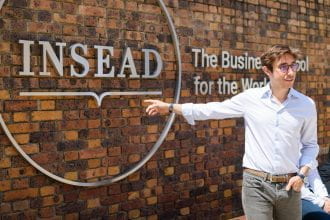In the old days, INSEAD advertised itself as a trilingual school. French, English and – yes, German would be permitted equally in class discussions as all participants were expected to have sufficient understanding of all three languages in order to follow the arguments. So much, for the theory. In reality, of course, German was neither popular nor functional, even though the school provided free German lessons taught by an exceptionally attractive young lady.
Quite understandably it always was more or less impossible for Japanese engineers, Indian lawyers or Brazilian economists to master three languages at an academic level, in addition to their own, and certain people, particularly Israelis, anyhow had understandable reservations vis-à-vis the German language.
However, at one point Thomas Heine-Geldern, just for the fun of it, started his presentation in German, which was perfectly legitimate according to the rules. Of course he was well aware, that hardly anyone who was not German, Austrian, Swiss or Dutch (for whom foreign languages was the least of their worries, as they spoke five to seven foreign languages) would be able to follow.
So when Thomas started his presentation in the language of Heinrich Heine, three Israeli participants immediately and clearly voiced their opposition and threatened to leave the room.
He switched to French, as he had planned to do anyway, and continued with a silent grin. Apparently it was not common knowledge in Israel that Heinrich Heine, one of Europe’s most revered intellectuals and poets of the 19th century, buried in the Cimetière de Montmartre in Paris, and an ancestor of Thomas Heine-Geldern, was very prominently Jewish.
Although it can be said that the nationality of participants played a very minor role at INSEAD, as our friendship and collegial spirit were clearly stronger, some historically rooted distances were felt now and then. Yes, INSEAD is a great place to meet wonderful people from all corners of the world in peace and friendship, but it is not, of course, completely removed from this world and its history.


